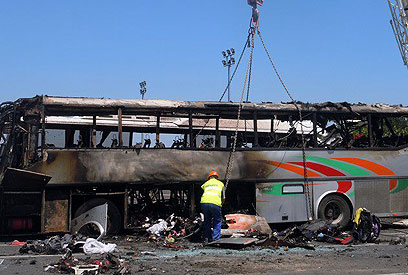
European Union foreign ministers today reached a unanimous decision to designate the military wing of Iranian-backed Hezbollah as a terrorist organization. The move, which will likely lead to travel bans and asset freezes, comes after months of deliberation and compromises between the proponents and opponents of the decision.
Catherine Ashton, the European Union's high representative for foreign policy, said the designation "does not prevent the continuation of dialogue with all political parties in Lebanon." In addition, she said that "the delivery of legitimate financial transfers to Lebanon and delivery of assistance from the European Union and its Member States will not be affected."
Hezbollah's role in the July 2012 Burgas terror attack as well as the recent conviction of Hezbollah operative Hossam Taleb Yaacoub in Cyprus are viewed as two of the key pieces of evidence that pushed forward the long-awaited designation. Hezbollah's continued involvement in the Syrian civil war in support of the Assad regime is also seen as a reason for the move.
The US, Israel, and Canada, have long called on the EU to designate Hezbollah. After Bulgaria announced in early February that Hezbollah was responsible for the attack in Burgas that killed five Israeli tourists and a Bulgarian national, Canadian Foreign Minister John Baird called on the EU to designate Hezbollah as a terror organization.
"We urge the European Union and all partners who have not already done so to list Hezbollah as a terrorist entity and prosecute terrorist acts committed by this inhumane organization to the fullest possible extent," Baird said.
Approximately two weeks later, former Obama national security adviser Tom Donilon wrote in the New York Times that "Europe must now act collectively and respond resolutely to this attack within its borders by adding Hezbollah to the European Union's terrorist list."
Israeli Justice Minister Tzipi Livni welcomed the EU's decision. "Finally, after years of deliberations, the claim that Hezbollah is a legitimate political party has rightfully failed. Now it is clear to the entire world that Hezbollah is a terrorist organization," she said. Prime Minister Benjamin Netanyahu similarly welcomed the decision and said he hoped it "will lead to tangible steps against the organization."
The United States also applauded the designation. "With today's action, the EU is sending a strong message to Hezbollah that it cannot operate with impunity, and that there are consequences for its actions, including last year's deadly attack in Burgas, Bulgaria, and for plotting a similar attack in Cyprus," Secretary of State John Kerry said.
The EU's decision to designate only the military wing of Hezbollah has left some disappointed, however. Israeli politician Avigdor Lieberman, for example, said the EU went only half way.
"Any attempt to portray this organization as one that has an extremist side and a more moderate side is like asking whether a cannibal could be a vegetarian," Lieberman said. Similarly, Emile Hokayem, an analyst at the International Institute for Strategic Studies, tweeted that making a distinction between military and political wings within Hezbollah "is an expedient construct, analytically useless and w[ith] no grounding in reality."
In October 2012, Naim Qassem, the deputy secretary general of Hezbollah, repudiated the idea that the group had separate political and military wings.
"We don't have a military wing and a political one; we don't have Hezbollah on one hand and the resistance party on the other," he said.
Three years before, Qassem told the Los Angeles Times that "Hezbollah has a single leadership.... All political, social and jihad work is tied to the decisions of this leadership.... The same leadership that directs the parliamentary and government work also leads jihad actions in the struggle against Israel."